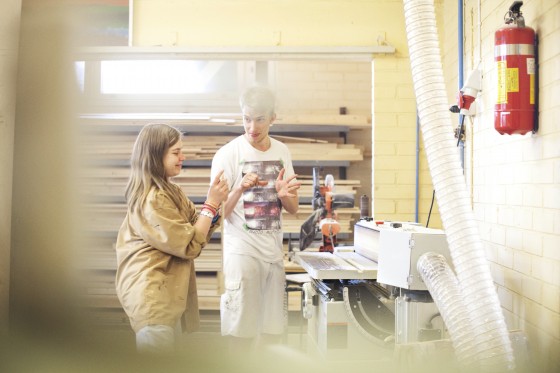 Kuva: Tuomas Linna
Kuva: Tuomas Linna There are several options of study paths after elementary school, and the same occupation can be achieved via very different routes. The most common choices are upper secondary school and vocational colleges that offer vocational degrees. Both the matriculation qualification and the vocational qualification may be obtained by completing a double degree.
Upper secondary schools and vocational schools are applied for during the joint enrolment in February-March. In addition, there is a joint enrolment for vocational qualifications and higher education during the autumn, but there are less available places than in the spring’s application term. According to the Schools Act and the Act on Vocational Education and Training, it is possible to study sign language as a mother tongue, if the student so chooses. The studies will still include written Finnish or Swedish studies.
If elementary grades want to be raised or more time is wanted to make choices, class ten is a possibility or you can apply for training that prepares you for vocational education (VALMA). Preparatory trainings and adult education studies have their own enrolments, and the dates vary.
The Finnish Folk High School for the Deaf provides sign language studies for those that use sign language, for hearing people and for immigrants. Rovala’s folk high school in Rovaniemi, Northern Savo Institute in Kuopio and Turku’s Christian Institute, on the other hand, offer studies to become a sign language instructor.
Upper secondary school
Upper secondary school is a generally educating educational institute, where the studies are carried out in different subject courses in periods of 1.5 months. At least 75 courses must be completed, and the subject combinations can be personally impacted within the limits of the school or their cooperation’s offerings. The upper secondary school syllabus can be completed in day or evening high school, as well as remotely. Generally, upper secondary school lasts 3-4 years, but additional time can be granted for the studies subject to legitimate reasons.
In addition to the conventional upper secondary schools, nowadays there are also a lot of Special upper secondary schools where specific studies of the school’s assignment area, can be carried out in addition to the upper secondary school syllabus and the matriculation examination. These can be, for example, natural sciences, arts or sports. Mikkeli’s Mikael School has previously also offered upper secondary school education for sign language users, but nowadays many people choose their nearby upper secondary school with interpretation. Several sign language users have also studied at Eira High School for Adults in Helsinki at the same time.
Towards the end of upper secondary school studies, a matriculation examination is carried out, in which, nowadays, at least four exams are carried out. Mother tongue is compulsory for all, but those born deaf or people with hearing loss in early childhood can replace it with an exam for Finnish as a second language. Three other tests can be selected from among general studies, mathematics, the second national language and foreign languages.
On the basis of statements, special arrangements or exemption from listening comprehension tests of foreign languages may be arranged. Examinations are held during the spring and the autumn, and the chosen subjects can be completed either during one examination period or other several periods.
The matriculation examination provides eligibility to apply for university. Universities of applied sciences and vocational schools can often be applied to with an upper secondary school certificate.
Vocational Studies
Basic vocational education and training can be applied for after elementary school or upper secondary school. The duration of the training depends on the applicant’s background and previous knowledge, but after elementary school, the studies typically take three years. When you have 3-5 years of relevant work experience, you may apply for a professional or specialist qualification.
Vocational qualifications can be completed in various domains. The studies include both teaching in the educational institution as well as practical learning at the school or at workplaces. Upper secondary studies and the matriculation examination can be completed alongside the vocational qualification.
In some sectors, there are requirements or recommendations for the applicant’s state of health, which should be verified before applying. Otherwise, adjustments and, if necessary, special arrangements can be applied for their studies.
A vocational qualification may also be acquired as an apprenticeship, in which most of the studies are completed in work duties. Apprenticeship training is based on a fixed-term employment contract, where the job centre customer can get wage subsidies. Written studies included in the qualification are carried out at the educational institution.
Vocational special education institutions
If special support is needed in vocational education studies and employment, vocational special needs education can be applied for. The studies included in vocational qualifications are studied in small groups, and instead of theory, the main focus of the studies is often practical work. In addition, students receive support for both studies and everyday life.
Students are made a statutory Individual Education Plan (IEP). The essential support measures and individual arrangements are recorded in it, which allow the customisation of studies. In case of a minor, the Individual Education Plan is completed in separate negotiations with the consent of the parents.
At least in the former Turku School of the Deaf vocational school, which is now known as AURA Institute and the Helsinki Central Park Vocational Institute has had students that are sign language users. In turn, the Bovallius Vocational Institute in Pieksämäki has history as a sign language economics school.
In addition to the basic degree education, special vocational schools organise preparatory training for basic vocational education and training experiments. The latter can be used to determine a young person’s suitability for a chosen education field. A commitment of expenditure can be obtained for the training experiment from Kela, job centre or an insurance institution. Some of the special vocational schools also arrange shorter familiarisation periods.




